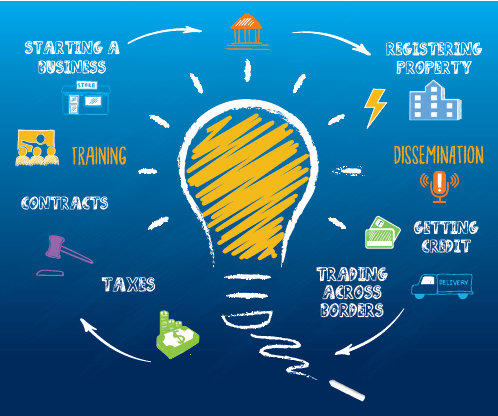‘Doing Business 2019’ – a World Bank Group flagship publication – investigates the regulations that enhance business activity and those that constrain it. The report presents quantitative indicators on business regulation and the protection of property rights that can be compared across 190 economies, and measures the processes for business incorporation, getting a building permit, obtaining an electricity connection, transferring property, getting access to credit, protecting minority investors, paying taxes, engaging in international trade, enforcing contracts and resolving insolvency.
The report highlights how governments worldwide are working to change the business regulatory framework in order to make doing business easier for entrepreneurs. Data show that from the 2nd of June 2017 to the 1st of May 2018, 128 economies have implemented 314 regulatory reforms and almost one-third of these reforms were focused on two areas: starting a business and enforcing contracts.
According to the report the 10 top performers have been Afghanistan, Djibouti (that focused its reform agenda on strengthening its legal framework and is the only economy from the MENA region in the 10 top improvers), China, Azerbaijan, India, Togo, Kenya, Ivory Coast, Turkey and Rwanda. These economies together have implemented a total of 62 regulatory reforms mainly in the area of starting a business, getting credit and paying taxes.
China is the only economy from East Asia and the Pacific in the 10 top improvers and focused its reforms on increasing efficiency of business processes.
Digitalisation was the common theme of the reforms implemented by Ivory Coast, Kenya, Rwanda and Togo. These four economies are among the 10 top performers making the Sub-Saharan Africa the most represented region in the Doing Business 2019 top list.
The implementation of regulatory reforms is affected by many factors such as political stability, the level of economic development, cultural specifics, environmental risks and many others. While some of them are not under governments’ direct control, other can be influenced. This is the case of the trainings provided to public officials and the way in which regulatory changes are communicated. By taking this into consideration this year’s edition also includes four case studies demonstrating that a better access to training and a more efficient communication have a considerable impact on the implementation of reforms.
Doing Business offers insights for policy makers to identify areas for reform and improve the local business environment.
Discover more data by reading the whole publication here.
Source: World Bank Group



